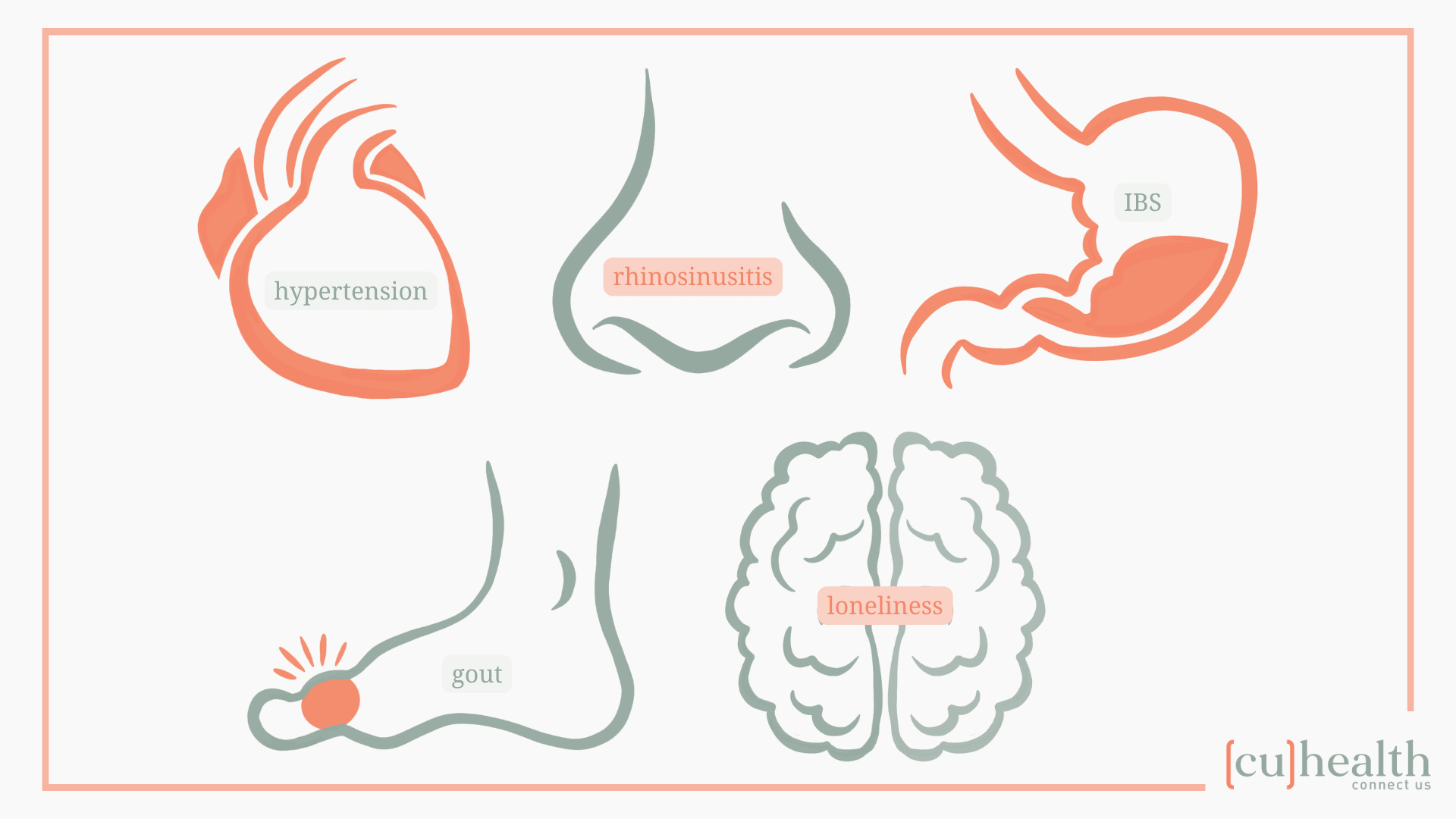Often, when we think about health-related productivity losses in a work sense, our minds drift to some of the more serious health challenges that people can face throughout their lives. But there are lots of irritations that we can often shrug off as unimportant or relatively minor that can, in reality, be a major drain on productivity at home and at work.
Let’s look at some of the common but often ignored problems that could be sapping engagement amongst your staff.
1. CHRONIC RHINOSINUSITIS
Not to be confused with hay fever (allergic rhinitis), chronic rhinosinusitis is an incredibly common inflammatory illness that affects up to one in five Australians. Dr Christopher Nguyen explains that this condition can have a profound impact on a person’s quality of life and ability to function if left untreated.
“Take for example, patient CK who has had longstanding allergic rhinitis for many years, and never thought to seek treatment. She suffers from chronic nasal congestion, itchy eyes, and sneezing. In some more severe cases, this can also result in snoring and daytime tiredness. This affects her ability to concentrate, creating unnecessary stress in both her working and personal life.”
Studies have shown that chronic rhinosinusitis is a cause of substantial financial loss for sufferers, due largely to an impaired ability to attend and work at usual capacity.
Dr Nguyen suggests a treatment plan from CK’s doctor may consist of simple allergen avoidance strategies and medications, which can drastically improve her quality of life. At times, a referral to an allergy specialist for allergen testing may also be appropriate.
2. GUT ISSUES
Nicole Saliba is an accredited dietician. She says that gastrointestinal complaints are very common and can have a profound effect on people’s lives and ability to work. One of the most common kinds of gastric distress is irritable bowl syndrome (IBS), which effects up to 30% of Australians and is most common in women.
Saliba gives the example of patient “Jane”. Jane is a 25-year-old woman working in a high-paced environment. Despite being relatively healthy, over the past few months her often sporadic gut complaints have become increasingly common and troublesome. Most days she wakes up with abdominal pain, bloating, diarrhea and bowel urgency. Her symptoms have become so bad that she can no longer catch public transport to work and avoids eating at work to avoid having an episode at work.
The abdominal pain she is experiencing is keeping her up at night and consequently her sleep has gone out the window.
All of these things have compounded and are starting to affect her performance at work. Eventually, Jane is having to call in to work sick because she feels so unwell and exhausted and is embarrassed by her symptoms.
Gastrointestinal complaints such as irritable bowel syndrome have a profound impact on an individual’s quality of life. It often goes undiagnosed leading to delays in treatment and poor quality of life. IBS makes up between 15-30% of GP visits and is the number one reason patients are referred to a gastroenterologist.
3. GOUT
One of the most common inflammatory joint conditions is gout. Dr Nguyen says up to 1 in 20 Australians will experience gout in any given year, with the majority being male and over the age of 40.
The primary symptom is sudden onset of excruciating joint pain most commonly affecting the joint between the big toe and the foot. It is caused by a buildup of uric acid in the blood, which then gets deposited as crystals on the joint. Commonly associated with a diet high in meat, shellfish and/or alcohol, it can be treated effectively with dietary changes and medication, but if left untreated can destroy the joint and cause ongoing severe pain.
4. HYPERTENSION
Up to one in three Australians are living with high blood pressure. According to research that includes 23% who are not attempting to control their hypertension and 11% who are currently taking medication. It is one of the most commonly diagnosed and most easily modified risk factors for cardiovascular disease.
Hypertension is defined as persistent blood pressure greater than 140/90 mmHg. High blood pressure is associated with an increased risk of stroke, heart attack, and kidney disease. Combined, these disorders are not only a mortality risk, they’re also a huge wellbeing and productivity suck. Research suggests hypertension “caused the loss of 609,801 productivity-adjusted life years, equating to AUD$137.2 billion in lost gross domestic product over the working lifetime.” It’s a big burden on people, the economy and individual business.
“Fortunately,” says D Nguyen, “hypertension is very manageable.” A typical management plan will involve a multidisciplinary approach with dietary advice, psychological support, and regular nursing follow-up for long-term management. Over time, blood pressure can be improved to normal levels and your risk of cardiovascular disease is greatly reduced.
5. LONELINESS
Easy to overlook, loneliness is a silent pandemic in this country. Compounded by the psychological burdens of the pandemic, half of all Australians report feeling lonely at least one day a week and a quarter report feeling lonely for three or more days of every week.
A negative emotional reaction to perceived social isolation, ongoing feelings of loneliness can trigger the onset of various mental health conditions such as depression, anxiety, hopelessness, panic, and even suicidal ideation. It is also not uncommon for those experiencing prolonged feelings of loneliness to feel exhausted and lacking in motivation, in turn impairing their ability to function optimally in the workplace.
Research suggests lonely workers take twice as many sick days and their emotions can spread to other members of their team, reducing the productivity of everyone around them too. One study also shows that less effective at work and receive lower performance ratings the lonelier they feel.
Dr Liz Goldenberg is a behavioural scientist. She says a lack of deep connection can be addressed through practical help at improving and enriching the quality of their social interactions. “A qualified psychologist may help alleviate the burden of mental ill-health, while a mental health coach may help the individual develop the interpersonal skills and competence needed to enrich their social relationships, thereby further strengthening their psychological health.”
Because the signs and symptoms of loneliness are subtle, it is common for lonely individuals to delay seeking help. As time passes without intervention, the feeling of loneliness can become further entrenched, deepening mental health problems. The sooner the individual is able to access the appropriate healthcare, the faster they will be able to alleviate feelings of loneliness as well as the associated mental health problems.
A broad-ranging wellbeing program can help your staff grapple with these and any number of other health problems, helping everyone to live their best life and perform at their peak. If you would like some advice, start a conversation with a CU Health expert today and begin your organisation’s journey to becoming a wellbeing employer of choice.





